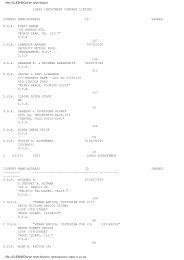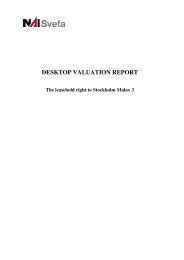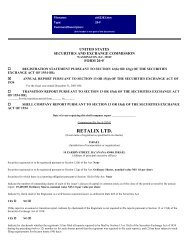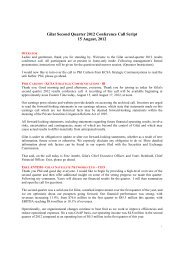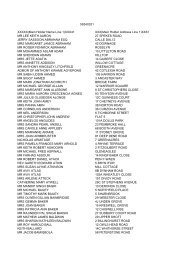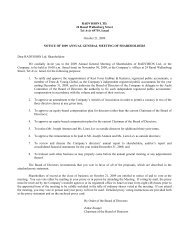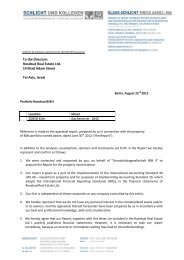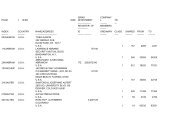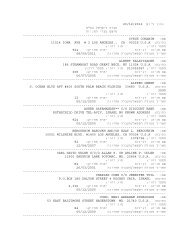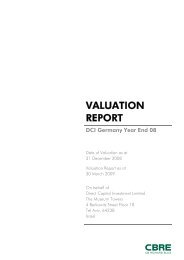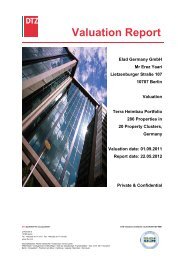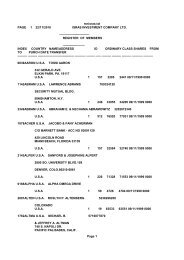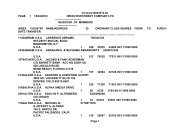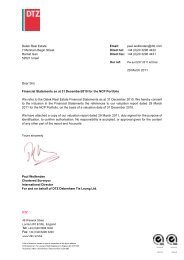XTL BIOPHARMACEUTICALS LTD.
XTL BIOPHARMACEUTICALS LTD.
XTL BIOPHARMACEUTICALS LTD.
You also want an ePaper? Increase the reach of your titles
YUMPU automatically turns print PDFs into web optimized ePapers that Google loves.
Holders of our ordinary shares or ADRs who are US residents may be required to pay additional income taxes.<br />
There is a risk that we will be classified as a passive foreign investment company (“PFIC”) for certain tax years. If we are classified as a<br />
PFIC, a US holder of our ordinary shares or ADRs representing our ordinary shares will be subject to special federal income tax rules that determine<br />
the amount of federal income tax imposed on income derived with respect to the PFIC shares. We will be a PFIC if either 75% or more of our gross<br />
income in a tax year is passive income or the average percentage of our assets (by value) that produce or are held for the production of passive income<br />
in a tax year is at least 50%. The risk that we will be classified as a PFIC arises because cash balances, even if held as working capital, are considered<br />
to be assets that produce passive income. Therefore, any determination of PFIC status will depend upon the sources of our income and the relative<br />
values of passive and non-passive assets, including goodwill. A determination as to a corporation’s status as a PFIC must be made annually. We<br />
believe that we were likely not a PFIC for the taxable year ended December 31, 2005. However, we believe that we were a PFIC for the taxable years<br />
ended December 31, 2006 and 2007. Although such a determination is fundamentally factual in nature and generally cannot be made until the close of<br />
the applicable taxable year, based on our current operations, we believe that we may be classified as a PFIC in the 2008 taxable year and possibly in<br />
subsequent years.<br />
In view of the complexity of the issues regarding our treatment as a PFIC, US shareholders are urged to consult their own tax advisors for<br />
guidance as to our status as a PFIC. For further discussion of tax consequences of being a PFIC, see US Federal Income Tax Considerations - Tax<br />
Consequences If We Are A Passive Foreign Investment Company,” below.<br />
Provisions of Israeli corporate law may delay, prevent or affect a potential acquisition of all or a significant portion of our shares or assets and<br />
therefore depress the price of our ordinary shares.<br />
We are incorporated in the State of Israel. Israeli corporate law regulates acquisitions of shares through tender offers. It requires special<br />
approvals for transactions involving significant shareholders and regulates other matters that may be relevant to these types of transactions. The<br />
provisions of Israeli law may delay or prevent an acquisition, or make it less desirable to a potential acquirer and therefore depress the price of our<br />
shares. Further, Israeli tax considerations may make potential transactions undesirable to us or to some of our shareholders.<br />
Israeli corporate law provides that an acquisition of shares in a public company must be made by means of a tender offer if, as a result of such<br />
acquisition, the purchaser would become a 25% or greater shareholder of the company. This rule does not apply if there is already another 25% or<br />
greater shareholder of the company. Similarly, Israeli corporate law provides that an acquisition of shares in a public company must be made by means<br />
of a tender offer if, as a result of the acquisition, the purchaser's shareholdings would entitle the purchaser to over 45% of the shares in the company,<br />
unless there is a shareholder with 45% or more of the shares in the company. These requirements do not apply if, in general, the acquisition (1) was<br />
made in a private placement that received the approval of the company’s shareholders; (2) was from a 25% or greater shareholder of the company<br />
which resulted in the purchaser becoming a 25% or greater shareholder of the company, or (3) was from a 45% or greater shareholder of the company<br />
which resulted in the acquirer becoming a 45% or greater shareholder of the company. These rules do not apply if the acquisition is made by way of a<br />
merger. Regulations promulgated under Israeli corporate law provide that these tender offer requirements do not apply to companies whose shares are<br />
listed for trading outside of Israel if, according to the law in the country in which the shares are traded, including the rules and regulations of the stock<br />
exchange or which the shares are traded, either:<br />
• there is a limitation on acquisition of any level of control of the company; or<br />
• the acquisition of any level of control requires the purchaser to do so by means of a tender offer to the public.<br />
Finally, in general, Israeli tax law treats specified acquisitions less favorably than does US tax law. See “Item 10. Additional Information -<br />
Taxation - Israeli Tax Considerations,” below.<br />
Our ADR holders are not shareholders and do not have shareholder rights.<br />
The Bank of New York, as depositary, executes and delivers our ADRs on our behalf. Each ADR is a certificate evidencing a specific number<br />
of ADSs. Our ADR holders will not be treated as shareholders and do not have the rights of shareholders. The depositary will be the holder of the<br />
shares underlying our ADRs. Holders of our ADRs will have ADR holder rights. A deposit agreement among us, the depositary and our ADR holders,<br />
and the beneficial owners of ADRs, sets out ADR holder rights as well as the rights and obligations of the depositary. New York law governs the<br />
deposit agreement and the ADRs. Our shareholders have shareholder rights. Israeli law and our Articles of Association, or Articles, govern shareholder<br />
rights. Our ADR holders do not have the same voting rights as our shareholders. Shareholders are entitled to our notices of general meetings and to<br />
attend and vote at our general meetings of shareholders. At a general meeting, every shareholder present (in person or by proxy, attorney or<br />
representative) and entitled to vote has one vote on a show of hands. Every shareholder present (in person or by proxy, attorney or representative) and<br />
entitled to vote has one vote per fully paid ordinary share on a poll. This is subject to any other rights or restrictions which may be attached to any<br />
shares. Our ADR holders may instruct the depositary to vote the ordinary shares underlying their ADRs, but only if we ask the depositary to ask for<br />
their instructions. If we do not ask the depositary to ask for the instructions, our ADR holders are not entitled to receive our notices of general meeting<br />
or instruct the depositary how to vote. Our ADR holders will not be entitled to attend and vote at a general meeting unless they withdraw the ordinary<br />
shares from the depository. However, our ADR holders may not know about the meeting enough in advance to withdraw the ordinary shares. If we ask<br />
for our ADR holders’ instructions, the depositary will notify our ADR holders of the upcoming vote and arrange to deliver our voting materials and<br />
form of notice to them. The depositary will try, as far as practical, subject to the provisions of the deposit agreement, to vote the shares as our ADR<br />
holders instruct. The depositary will not vote or attempt to exercise the right to vote other than in accordance with the instructions of the ADR holders.<br />
We cannot assure our ADR holders that they will receive the voting materials in time to ensure that they can instruct the depositary to vote their shares.<br />
In addition, there may be other circumstances in which our ADR holders may not be able to exercise voting rights.<br />
13



